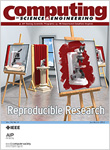
COMPUTING IN SCIENCE & ENGINEERING
Scope & Guideline
Empowering Innovation Through Collaborative Research.
Introduction
Aims and Scopes
- High-Performance Computing (HPC):
The journal emphasizes advancements in high-performance computing, including discussions on exascale systems and their applications in scientific research. - Software Development and Engineering Practices:
It explores best practices in software development tailored for scientific computing, including continuous integration, reproducibility, and sustainable software practices. - Data Management and Visualization:
The journal covers innovative techniques in data management, visualization, and analysis, particularly in complex scientific datasets. - Interdisciplinary Collaboration:
Promoting collaboration across disciplines is a key focus, encouraging the integration of computing methodologies in diverse fields such as physics, climate science, and biomedical research. - Emerging Technologies:
The journal addresses the impact of emerging technologies, such as quantum computing and AI, on scientific research and engineering applications. - Educational Approaches in Computational Science:
It highlights educational methodologies aimed at improving the skills of future scientists and engineers in computational techniques.
Trending and Emerging
- Artificial Intelligence and Machine Learning:
There is a significant increase in research focusing on AI and machine learning applications in scientific discovery, automation, and data analysis, reflecting the growing importance of these technologies in computational science. - Software Sustainability and Community Building:
A trend towards sustainability in software development practices and the establishment of communities supporting collaborative software engineering efforts is evident. - Cloud Computing and Data Accessibility:
Emerging themes include the utilization of cloud-native approaches for scientific computing, emphasizing data accessibility and collaborative research environments. - Reproducibility and Transparency:
A heightened focus on reproducibility in scientific research practices indicates a commitment to transparency and validation of computational results. - Quantum Computing Integration:
The exploration of quantum computing paradigms and their integration into high-performance computing frameworks is becoming a prominent theme. - Diversity, Equity, and Inclusion in STEM:
There is an emerging emphasis on addressing diversity and inclusivity within computing and engineering fields, fostering a more equitable research environment.
Declining or Waning
- Traditional Programming Languages:
There is a noticeable decrease in publications focused on traditional programming languages like Fortran, as the community shifts towards more modern languages such as Python and Julia. - General Computational Models Without Specific Applications:
Research that presents generic computational models without a clear application context is becoming less frequent, as the journal favors case studies with practical implications. - Standalone Research Software:
The focus is moving away from isolated software projects towards integrated systems that encompass broader software ecosystems and collaborative tools. - Basic Algorithmic Studies:
There is a waning interest in purely theoretical algorithmic studies that do not translate into practical applications, as the journal leans towards applied research. - Single-Disciplinary Research:
Research confined to a single discipline is less prominent, with a growing emphasis on interdisciplinary approaches that leverage computing across various scientific fields.
Similar Journals
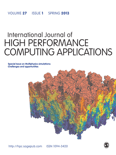
INTERNATIONAL JOURNAL OF HIGH PERFORMANCE COMPUTING APPLICATIONS
Fostering Global Collaboration in Advanced Computing ResearchThe INTERNATIONAL JOURNAL OF HIGH PERFORMANCE COMPUTING APPLICATIONS, published by SAGE PUBLICATIONS LTD, is a leading academic journal dedicated to the advancement of high-performance computing in various domains, including hardware, software, and theoretical frameworks. With a strong commitment to disseminating innovative research since its inception in 1987, the journal plays a pivotal role in bridging the gap between theoretical advancements and practical applications in computing. Featuring an impressive impact across its categories—ranked Q2 in Hardware and Architecture, Software, and Theoretical Computer Science—this journal appeals to a diverse audience of researchers and professionals seeking to explore the latest developments and applications in high-performance computing. The journal is accessible via various open access options, ensuring that cutting-edge research is available to a wide readership, fostering collaboration and knowledge-sharing within the global computing community. Scholars interested in pushing the boundaries of technology and its applications will find this journal an invaluable resource as it continues to evolve towards its projected convergence years, extending its influence through 2024 and beyond.

Frontiers in Physics
Advancing the Boundaries of Physics ResearchFrontiers in Physics is a prestigious peer-reviewed journal published by FRONTIERS MEDIA SA, dedicated to advancing the field of physics through innovative research and interdisciplinary approaches. Established as an Open Access journal in 2013, it has quickly become a vital resource for researchers, professionals, and students alike, with a shining presence in Scopus categories such as Biophysics, Materials Science, Mathematical Physics, and Physical Chemistry. With an impressive array of quartile rankings, including Q2 in several key areas, it positions itself firmly among leading journals in the field, reflecting its commitment to high-quality contributions. The journal's global reach and emphasis on collaborative research not only enhance its visibility in the scientific community but also facilitate a deeper understanding of complex physical phenomena. Researchers are encouraged to submit original works that push the boundaries of knowledge, making Frontiers in Physics an essential platform for the latest advancements in the discipline.
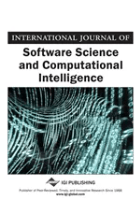
International Journal of Software Science and Computational Intelligence-IJSSCI
Driving Progress in Algorithm Development and Machine LearningInternational Journal of Software Science and Computational Intelligence (IJSSCI) is a prominent academic journal published by IGI Global, dedicated to advancing the fields of software science and computational intelligence. With its ISSN 1942-9045 and E-ISSN 1942-9037, IJSSCI offers a platform for researchers, practitioners, and students to disseminate innovative research findings, theoretical advancements, and practical applications in areas such as algorithm development, machine learning, and software engineering. Although the journal currently does not operate under an open access model, its rigorous peer-review process ensures high-quality publications that contribute significantly to the academic discourse. Based in Hershey, PA, IJSSCI is recognized for its commitment to fostering collaboration among professionals in the technology and computer science fields, making it an essential resource for those looking to stay at the forefront of software science advancements.
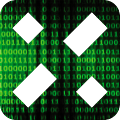
SoftwareX
Catalyzing Progress through Open Access Software InsightsSoftwareX is an innovative open-access journal published by Elsevier that has been championing advancements in the fields of Computer Science and Software since its inception in 2015. With a focus on presenting high-quality research, SoftwareX aims to foster collaboration and knowledge exchange among researchers and practitioners, advancing the way software and tools are developed and disseminated within the community. This journal operates under a flexible access model, allowing broad visibility and accessibility to its diverse readership. Positioned in the Q2 and Q3 quartiles of the Scopus ranking system within the domains of Computer Science Applications and Software respectively, SoftwareX stands as an influential platform for sharing cutting-edge methodologies and innovations. The journal's aim is not only to serve as a repository of knowledge but also to embolden practitioners and scholars alike to engage with and implement findings that can accelerate progress within the realms of software engineering and application. Situated in Amsterdam, Netherlands, SoftwareX has embraced an international reach, welcoming submissions that address complex challenges through novel software solutions.
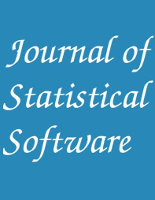
Journal of Statistical Software
Empowering research through cutting-edge statistical software.Journal of Statistical Software, published by the esteemed Journal Statistical Software, stands as a premier platform for the dissemination of cutting-edge research in the fields of statistical software development, methodologies, and applications. With an impressive impact factor and consistently ranking in the Q1 quartile for Software, Statistics and Probability, and Statistics, Probability and Uncertainty as of 2023, this journal is recognized globally for its scholarly contributions and innovative content. The journal has been an Open Access publication since 1996, facilitating unrestricted access to high-quality research for a diverse audience, including researchers, professionals, and students. As the journal converges into its 28th volume in 2024, it continues to maintain a strong presence in key academic rankings—evidenced by its stellar Scopus rank, where it is placed in the top 5% of journals in its field. Located at UCLA Department of Statistics, in Los Angeles, this journal is dedicated to fostering the advancement of statistical software and its role in enhancing scientific research across multiple disciplines.

TECHNICAL PHYSICS LETTERS
Fostering Collaboration for Complex ChallengesTechnical Physics Letters, an esteemed publication of MAIK Nauka/Interperiodica/Springer, serves as a pivotal platform for advancing the field of physics and astronomy since its establishment in 1996. This journal, with its ISSN 1063-7850 and e-ISSN 1090-6533, not only publishes high-quality research articles but also encourages innovative discussions and practical applications within the diverse realms of technical physics. With a solid reputation reflected in its Q3 category ranking within the broader physics and astronomy landscape, it aims to connect researchers and professionals who seek to address contemporary challenges and encourage multidisciplinary approaches to complex scientific problems. Although the journal does not currently offer open access options, it remains accessible to a wide readership, fostering a collaborative spirit among the scientific community. As it converges its efforts from 1996 to 2024, Technical Physics Letters is poised to be an essential resource for anyone looking to stay at the forefront of physics research.
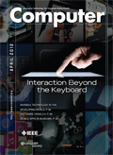
COMPUTER
Illuminating Trends in Computer Science for a Digital Age.COMPUTER, published by the IEEE COMPUTER SOC, stands as a pivotal resource in the field of computer science, encompassing a broad range of topics and innovations within the industry. With an ISSN of 0018-9162 and E-ISSN 1558-0814, this esteemed journal features high-impact research articles that contribute significantly to the advancement of technology, demonstrating a prestigious Q1 classification in the Computer Science (miscellaneous) category for 2023. Positioned within the top percentile of Scopus rankings (ranked #84 out of 232), COMPUTER serves as an essential platform for sharing pioneering ideas and emerging trends that shape the future of computing. Although it does not currently offer open access, the journal's rigorous peer-review process ensures the publication of high-quality content. Researchers, professionals, and students alike will find invaluable insights into computer science developments from 1970 through 2024, making it a vital tool for anyone dedicated to this ever-evolving field.

Revista Brasileira de Computacao Aplicada
Connecting Researchers, Professionals, and StudentsRevista Brasileira de Computação Aplicada is a distinguished peer-reviewed journal dedicated to disseminating innovative research and advancements in the field of applied computing. Published by UNIV PASSO FUNDO, this open-access journal has been serving the global academic community since 2009, ensuring that high-quality research is accessible to all. With its ISSN 2176-6649, the journal aims to foster collaboration and dialogue among researchers, professionals, and students, bridging the gap between theory and practice in computing. Positioned as an essential resource for those interested in the latest trends and developments in applied computational technologies, the journal strives to contribute significantly to the scholarly discourse and enhance knowledge sharing within this dynamic field. For researchers looking to publish their findings or professionals seeking to stay updated on cutting-edge research, the Revista Brasileira de Computação Aplicada serves as an invaluable platform that empowers the evolution of applied computing in Brazil and beyond.

NEURAL COMPUTING & APPLICATIONS
Illuminating the Future of AI and Software DevelopmentNEURAL COMPUTING & APPLICATIONS is a premier journal dedicated to the burgeoning fields of Artificial Intelligence and Software Engineering, published by Springer London Ltd. Established in 1993, the journal serves as a pivotal platform for disseminating cutting-edge research and innovative applications in neural computing, covering a broad range of topics from algorithm development to real-world applications. With its impressive categorization in the 2023 Journal Quartiles—ranging Q2 in Artificial Intelligence and Q1 in Software—it stands out in its discipline, ranking 42nd out of 407 in Computer Science Software and 50th out of 350 in Computer Science Artificial Intelligence, reflecting its significant impact in the academic community. Although not an open access journal, it provides vital access to significant findings and methodologies that drive advancements in technology. Researchers, professionals, and students looking to stay abreast of the most relevant and impactful developments in these fields will find NEURAL COMPUTING & APPLICATIONS an indispensable resource.
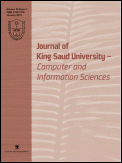
Journal of King Saud University-Computer and Information Sciences
Advancing Knowledge in Computer Science and ITJournal of King Saud University-Computer and Information Sciences, published by ELSEVIER, is a prestigious open-access journal focusing on the rapidly evolving fields of computer science and information technology. Since its inception in 1996, this journal has provided a platform for high-quality research and innovative ideas, promoting the dissemination of knowledge to a global audience. With a remarkable impact factor and ranked Q1 in the Computer Science (miscellaneous) category as of 2023, it stands among the top 11% of journals in its field, reflecting its commitment to excellence and relevance. The journal proudly carries the ISSN 1319-1578 and E-ISSN 2213-1248, and it is based in Saudi Arabia while being part of a global academic network. With a Scopus rank of #26 out of 232 in general computer science, the Journal of King Saud University-Computer and Information Sciences is an essential resource for researchers, professionals, and students seeking to stay at the forefront of technological advancement. As it continues to thrive through 2024, it invites contributions that will shape the future of computing and information sciences.